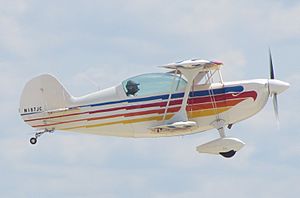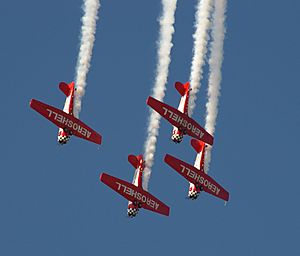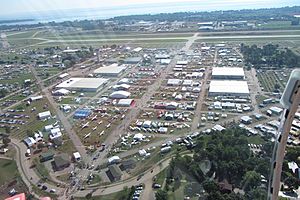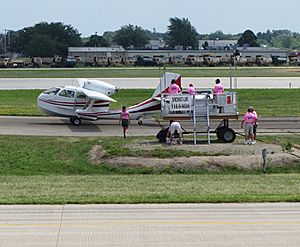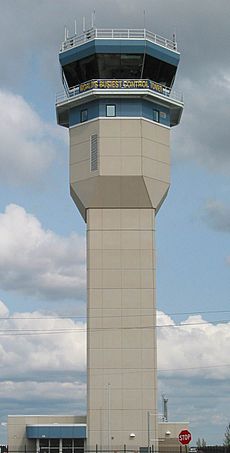EAA AirVenture Oshkosh facts for kids
Quick facts for kids AirVenture |
|
|---|---|
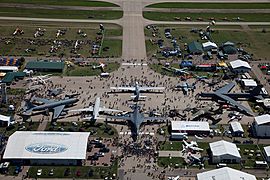
View of Boeing Plaza at EAA Airventure 2017
|
|
| Status | Active |
| Genre | Air show |
| Dates | Typically the last full week in July |
| Begins | July 21, 2025 |
| Ends | July 27, 2025 |
| Frequency | Annually |
| Venue | Wittman Regional Airport Pioneer Airport Vette/Blust Seaplane Base |
| Location(s) | Oshkosh–Nekimi, Wisconsin |
| Established | 1953 |
| Previous event | July 21–27, 2025 |
| Attendance | 686,000 (2024) |
| Activity | Aerobatic displays, static displays |
| Organized by | Experimental Aircraft Association (EAA) |
| Website | https://www.eaa.org/en/airventure |
EAA AirVenture Oshkosh, often called just Oshkosh, is a huge yearly air show. It's a big get-together for people who love airplanes and flying. The event happens every summer in Oshkosh, Wisconsin, at the Wittman Regional Airport and Pioneer Airport. There's even a special area for seaplanes on Lake Winnebago.
The Experimental Aircraft Association (EAA) organizes this amazing show. The EAA is a worldwide group for people interested in aviation. AirVenture is the biggest event of its kind in the world! It lasts for a whole week, usually starting on the Monday of the last full week in July. During this week, the airport's control tower becomes the busiest in the world because of all the planes flying in and out.
Contents
History of AirVenture
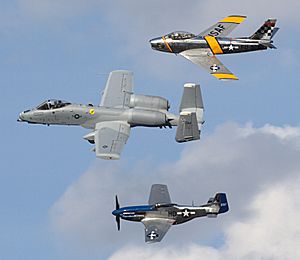
The EAA group started in 1953 in Wisconsin. It was founded by Paul Poberezny, who was an aircraft designer and military pilot. He began the group in his home basement for people who built or fixed up their own planes.
Over the years, the EAA grew to include almost every part of flying. This includes planes for fun, commercial planes, military planes, and even space travel!
Where the Fly-In Started
The very first EAA fly-in was in September 1953. It was a small part of a bigger air show in Milwaukee. Fewer than 150 people visited, and only a few planes showed up.
By 1959, the EAA fly-in became too big for the Milwaukee show. So, it moved to Rockford, Illinois. Then, in 1970, it outgrew the Rockford airport too. That's when it moved to its current home in Oshkosh, Wisconsin.
Much of the show's growth is thanks to Paul Poberezny's son, Tom Poberezny. He was a world champion in aerobatics (fancy flying tricks). He became the chairman of the event in 1977.
Name Changes and Access
For many years, the show was officially called The EAA Annual Convention and Fly-In. In 1998, its name changed to AirVenture Oshkosh. But many people who go every year still call it The Oshkosh Airshow or just Oshkosh.
Before 1997, only EAA members could go onto the flight line. Then, the rules changed. Now, all visitors can explore the entire show grounds. AirVenture hosts nearly 1,000 talks and workshops. Many companies also set up booths to sell aircraft parts and other cool aviation items.
The AirVenture show in 2020 was canceled because of the COVID-19 pandemic.
Cool Planes Debuting at AirVenture
AirVenture has been the first place many amazing new aircraft designs were shown to the world.
- In 1972, Richard VanGrunsven showed off his RV-3. This homebuilt plane changed how people thought about aircraft performance. VanGrunsven went on to build more homebuilt planes than anyone else!
- In 1975, aircraft designer Burt Rutan introduced his VariEze. This plane used a new way of building with fiberglass plastic. Many other planes later used this method.
- In 1987, the founders of Cirrus Aircraft showed their VK-30 kit plane. This led to the popular SR20 and SR22. These were the first planes to use all-composite fiberglass, digital cockpits, and even a ballistic parachute for safety!
Other cool planes first seen at AirVenture include the Christen Eagle II in 1978, the Glasair 1 in 1980, and the Lancair 200 in 1985. More recently, in 2018, Jack Bally showed his Bally Bomber B-17. This is a one-third scale replica of the famous Boeing B-17 Flying Fortress. Also, Mike Patey introduced DRACO, a special PZL-104 Wilga plane built for short takeoffs and landings.
How Many People Attend?
EAA estimated that 608,000 people attended in 2021. In 2018, 2,714 visitors came from 87 different countries. About 10,000 aircraft were there, including 2,979 show planes. There were also 867 companies showing their products.
The EAA CEO, Jack Pelton, announced that the 2024 event had a record-breaking 686,000 attendees. This was the highest number in the organization’s history! It beat the previous record of 677,000 set in 2023. He also said that around 10,000 aircraft arrived for the 2024 event. The attendance for 2025 was approximately 704,000.
The huge number of planes arriving and leaving makes the Wittman Regional Airport control tower the busiest in the world during AirVenture week. To manage all this air traffic, a special guide is published each year. It explains all the normal and emergency flying rules. More than 4,000 volunteers help out for about 250,000 hours before, during, and after the event!
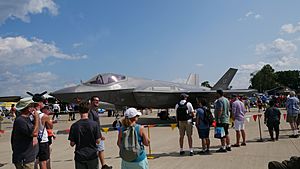
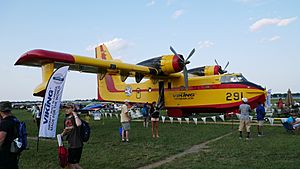
Economic Impact
The EAA AirVenture fly-in brings a lot of money to the Oshkosh area and the state of Wisconsin. In 1982, it was reported that the fly-in helped the local economy a lot.
A study in 2008 showed that the event had a $110 million impact on the Oshkosh area. This included money spent directly and money that spread through the local economy. The fly-in also created about 1,700 jobs. In 2017, it was estimated that the event had over a $170 million impact on the surrounding area.
Air Traffic Control
In 1961, the Rockford EAA airshow had 10,000 plane movements (takeoffs and landings). By 1971, the Oshkosh show had 600 planes and 31,653 movements. Today, AirVenture brings in more than 10,000 airplanes! Special air traffic rules are used to keep everything safe and organized.
Air traffic controllers and staff from across the country volunteer to work at the event. In 2008, 172 air traffic experts from 56 different places volunteered. They wear bright pink shirts so they are easy to spot in the crowd!
In 2013, the government faced budget cuts. This meant the Federal Aviation Administration (FAA) could not send staff to support AirVenture for free. The EAA had to pay $447,000 to cover the cost of FAA services. The EAA later made an agreement to pay for these specific costs and ensure FAA participation for nine more years.
Airports Used for AirVenture
- Wittman Regional Airport (OSH): Main airport for airplanes
- Pioneer Airport (WS17): For helicopters and airships
- Ultralight Fun Fly Zone: For ultralights, powered parachutes, and hot air balloons
- Vette/Blust Seaplane Base (96WI): For seaplanes
- Fond du Lac County Airport (FLD): Used for extra parking and as a backup airport
- Appleton International Airport (ATW): Also used for extra parking and as a backup airport
- Austin Straubel International Airport (GRB): Another backup airport for parking
- Planeacres Airport (2WN7): An emergency backup airport
Volunteering at AirVenture
EAA AirVenture relies a lot on volunteers. They arrive weeks before the air show starts. Volunteers do many different jobs. They help park cars and planes, paint buildings, and set up concerts and shows. Long-time volunteers often get free meals, t-shirts, patches, and free entry to the event.
National Blue Beret
National Blue Beret (NBB) is a special program for the Civil Air Patrol. It lasts for two weeks, with the second week happening during the AirVenture airshow. Young people and adult members of the Civil Air Patrol can apply to join this program. If chosen, they help with event operations. This includes guiding planes, managing crowds, and helping with emergency services.
See also
 In Spanish: EAA AirVenture Oshkosh para niños
In Spanish: EAA AirVenture Oshkosh para niños
- EAA Aviation Museum
- EAA Biplane
- Jack Pelton
- Project Schoolflight
- Sport Aviation magazine
- Steve Wittman
- Sun 'n Fun
- Tannkosh
- Young Eagles


